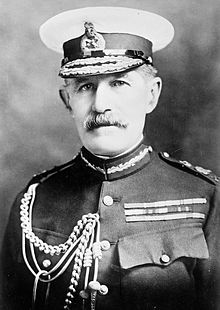| Revision as of 23:12, 8 January 2025 editHansmuller (talk | contribs)Extended confirmed users8,374 edits Oosthuizen's death and grave← Previous edit | Revision as of 00:38, 9 January 2025 edit undoTheBritinator (talk | contribs)Autopatrolled, Extended confirmed users, New page reviewers10,039 edits removed Category:Battles involving the United Kingdom using HotCatNext edit → | ||
| Line 42: | Line 42: | ||
| ] | ] | ||
| ] | ] | ||
| ] | |||
| ] | ] | ||
| ] | ] | ||
Revision as of 00:38, 9 January 2025
Battle of the Second Boer War| Battle of Dwarsvlei / Action at Onrust | |||||||
|---|---|---|---|---|---|---|---|
| Part of Second Boer War | |||||||
| |||||||
| Belligerents | |||||||
|
|
| ||||||
| Commanders and leaders | |||||||
|
|
| ||||||
| Strength | |||||||
| 1335, a Colt Gun, two Guns of the 78th Battery, three Ambulances and forty Wagons | 150 | ||||||
The Battle of Dwarsvlei (Afrikaans: Slag van Dwarsvlei, Action at Onrust) in the Second Boer War (1899-1902) was fought by Boer and British forces on 11 July 1900 in the district of Krugersdorp, South African Republic. The action at Dwarsvlei was part of Koos de la Rey's new guerilla strategy and coincided with the battles at Silkaatsnek and Onderstepoort on the same day of July 11, 1900.
Battle
The 150 strong Boers, mainly Krugersdorp Commando under General Sarel Oosthuizen (known as "Rooibul", the Red Bull of Krugersdorp, because of his red beard) ambushed British troops of the 1st Gordon Highlanders and the King's Shropshire Light Infantry under Major general Horace Smith-Dorrien on Oosthuizen's own farm. The Boers were armed with a variety of rifles such as Mausers, Lee-Metfords, Martini-Henry's and Guedes Model 1885.
They attacked the British convoy on its way from Krugersdorp in the south to Hekpoort in the north from high ground positions - marked Z on Smith-Dorrien's map - on the Witwatersberg mountain range ridge overlooking an intersection on the Krugersdorp-Hekpoort road.
The battle raged all day and at dusk Oosthuizen was seriously wounded when he tried in vain to capture the English cannons, with only a few burghers. He died from his wounds on 14 August 1900. The British withdrew while the Boers were too weak to follow up.


See also
Further reading
- Heath, Isak S. (1999). Die Rooi Bul van Krugersdorp : veggeneraal S.F. Oosthuizen : sy aandeel in die verloop van die Anglo-Boere-Oorlog 1899-1900 [The Red Bull of Krugersdorp : general S.F. Oosthuizen : his share in the course of the Anglo-Boer War 1899-1900] (in Afrikaans). I. Heath, Centurion (1008 Wilhelm Rd., Eldoraigne, Centurion 0157). ISBN 9780620248204. OCLC 46312882. Biography. 46 pages.
- Smith-Dorrien, Horace Lockwood (1925). "Chapter XV. Lines of communication, Unrest and Olifants Nek". Memories of forty-eight years' service. London: J. Murray. pp. 215–226. OCLC 906132684. 522 pages. Full text on Archive.org.

References
- ^ Shaw, John (October 1999). "Dwarsvlei, a Highveld farm: Forgotten battlefield of the Anglo-Boer War". Military History Journal. 11 (3/4). The South African Military History Society. Die Suid-Afrikaanse Krygshistoriese Vereniging. Archived from the original on 2024-12-07. Retrieved 8 January 2025., or at "Dwarsvlei, near Pretoria". sahistory.org.za. South African History Online towards a people's history. SAHO. Retrieved 8 January 2025.
- ^ Smith-Dorrien, Horace Lockwood (1925). "Chapter XV. Lines of communication, Unrest and Olifants Nek". Memories of forty-eight years' service. London: J. Murray. pp. 215–226. OCLC 906132684. Smith-Dorrien mistakenly refers to his opponent Oosthuizen as "Oosterheyzen".
- "Dwarsvlei. South African Battle: 11 July 1900". battletoursza.com. Battle Tours ZA 2019. 2019. Retrieved 8 January 2025.
- "Battles, units and casualties - Boer War Forum". AngloBoerWar.com. David Biggins. Retrieved 8 January 2025.
- Austrian made Österreichische Waffenfabrik Gesellschaft Steyr ‘Guedes’ Espingarda M1885 design, falling block 8 x 60mm calibre single shot rifle. Compare "Austrian Steyr (Portuguese) M1885/6 'Guedes' Rifle". michaeldlong.com. Military Swords Ltd. Retrieved 8 January 2025.
- Carruthers, Vincent (April 29, 2022). "A Short History of the Battle of Dwarsvlei". Retrieved 8 January 2025.
- Walker, Derek (26 August 2011). "OOSTHUIZEN Sarel Francois 1862-1900 :: OOSTHUIZEN Izak Johannes 1882- 1902". graves.eggsa.org/gauteng. eGGSA library. Genealogical Society of SA. (South Africa). Retrieved 8 January 2025.
(Text on tombstone:) Ter gedagtenis aan / twee broeders / gesneuveld in de oorlog / 1899.-1902. / Vecht Genrl Sarel François / Oosthuizen / gebore 22 Maart 1862. / Overle. 14 Aug. 1900. / en / Korprl Izak Johannes / Oosthuizen / Geb. 18 Jan. 1882/ Overl. 20 April 1900.
Photo of the Oosthuizen tombstone at Burgershoop cemetery, Krugersdorp.